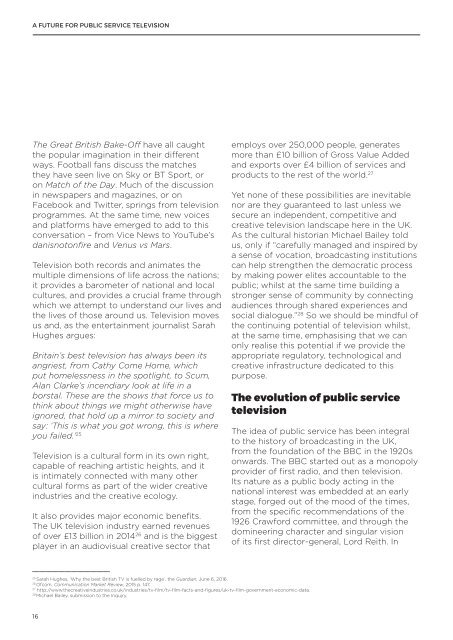A FUTURE FOR PUBLIC SERVICE TELEVISION CONTENT AND PLATFORMS IN A DIGITAL WORLD
FOTV-Report-Online-SP
FOTV-Report-Online-SP
Create successful ePaper yourself
Turn your PDF publications into a flip-book with our unique Google optimized e-Paper software.
A <strong>FUTURE</strong> <strong>FOR</strong> <strong>PUBLIC</strong> <strong>SERVICE</strong> <strong>TELEVISION</strong><br />
The Great British Bake-Off have all caught<br />
the popular imagination in their different<br />
ways. Football fans discuss the matches<br />
they have seen live on Sky or BT Sport, or<br />
on Match of the Day. Much of the discussion<br />
in newspapers and magazines, or on<br />
Facebook and Twitter, springs from television<br />
programmes. At the same time, new voices<br />
and platforms have emerged to add to this<br />
conversation – from Vice News to YouTube’s<br />
danisnotonfire and Venus vs Mars.<br />
Television both records and animates the<br />
multiple dimensions of life across the nations;<br />
it provides a barometer of national and local<br />
cultures, and provides a crucial frame through<br />
which we attempt to understand our lives and<br />
the lives of those around us. Television moves<br />
us and, as the entertainment journalist Sarah<br />
Hughes argues:<br />
Britain’s best television has always been its<br />
angriest, from Cathy Come Home, which<br />
put homelessness in the spotlight, to Scum,<br />
Alan Clarke’s incendiary look at life in a<br />
borstal. These are the shows that force us to<br />
think about things we might otherwise have<br />
ignored, that hold up a mirror to society and<br />
say: ‘This is what you got wrong, this is where<br />
you failed.’ 25<br />
Television is a cultural form in its own right,<br />
capable of reaching artistic heights, and it<br />
is intimately connected with many other<br />
cultural forms as part of the wider creative<br />
industries and the creative ecology.<br />
It also provides major economic benefits.<br />
The UK television industry earned revenues<br />
of over £13 billion in 2014 26 and is the biggest<br />
player in an audiovisual creative sector that<br />
employs over 250,000 people, generates<br />
more than £10 billion of Gross Value Added<br />
and exports over £4 billion of services and<br />
products to the rest of the world. 27<br />
Yet none of these possibilities are inevitable<br />
nor are they guaranteed to last unless we<br />
secure an independent, competitive and<br />
creative television landscape here in the UK.<br />
As the cultural historian Michael Bailey told<br />
us, only if “carefully managed and inspired by<br />
a sense of vocation, broadcasting institutions<br />
can help strengthen the democratic process<br />
by making power elites accountable to the<br />
public; whilst at the same time building a<br />
stronger sense of community by connecting<br />
audiences through shared experiences and<br />
social dialogue.” 28 So we should be mindful of<br />
the continuing potential of television whilst,<br />
at the same time, emphasising that we can<br />
only realise this potential if we provide the<br />
appropriate regulatory, technological and<br />
creative infrastructure dedicated to this<br />
purpose.<br />
The evolution of public service<br />
television<br />
The idea of public service has been integral<br />
to the history of broadcasting in the UK,<br />
from the foundation of the BBC in the 1920s<br />
onwards. The BBC started out as a monopoly<br />
provider of first radio, and then television.<br />
Its nature as a public body acting in the<br />
national interest was embedded at an early<br />
stage, forged out of the mood of the times,<br />
from the specific recommendations of the<br />
1926 Crawford committee, and through the<br />
domineering character and singular vision<br />
of its first director-general, Lord Reith. In<br />
25<br />
Sarah Hughes, ‘Why the best British TV is fuelled by rage’, the Guardian, June 6, 2016.<br />
26<br />
Ofcom, Communication Market Review, 2015 p. 147.<br />
27<br />
http://www.thecreativeindustries.co.uk/industries/tv-film/tv-film-facts-and-figures/uk-tv-film-government-economic-data.<br />
28<br />
Michael Bailey, submission to the Inqujry,<br />
16


